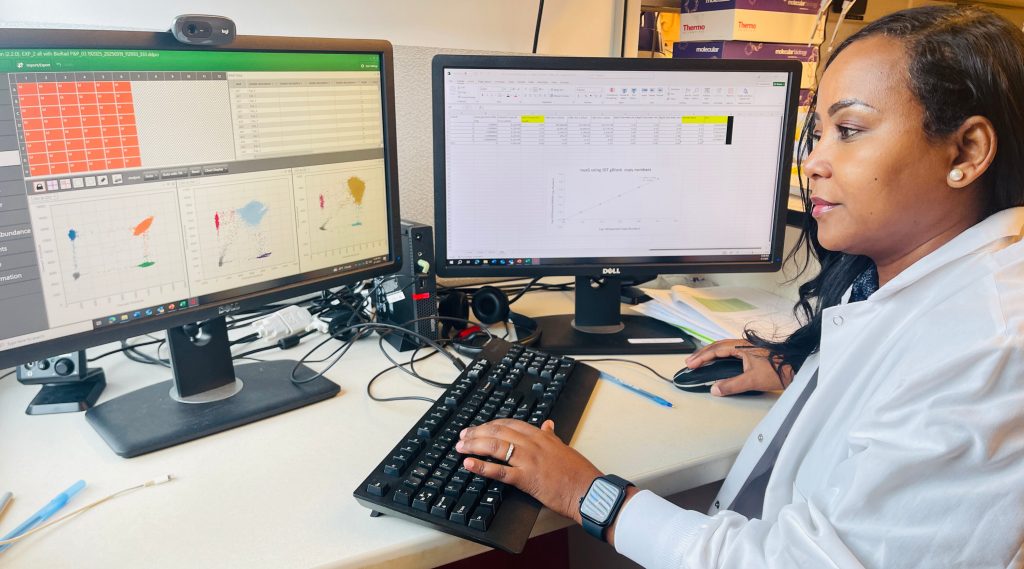Colorectal Cancer and Gut Microbiome: How Fusobacterium nucleatum May be Involved in Disease Progression

The human body harbors trillions of microbes that are responsible for a myriad of essential functions, known as the microbiome. The bacteria that make up the microbiome can be beneficial, aiding digestion, supporting immune systems, and influencing gut, heart, and brain health. However, some bacteria can be harmful and contribute to disease.
A recent study published in Gastro Hep Advances led by researchers with the University of Washington (UW) Department of Epidemiology and Fred Hutch Cancer Center, adds to growing evidence suggesting that the presence of one bacterium in the gut, Fusobacterium nucleatum, is associated with certain molecular attributes of colorectal tumors and poorer survival rates, indicating a potential role in the progression of disease.
Fusobacterium nucleatum (Fn) is an anaerobic bacterium, typically found in the mouth. However, for some people, Fn migrates from the oral microbiome to the gut, where it appears to be linked with colorectal cancer (CRC).
“Previous research found that Fusobacterium nucleatum is present in the gut for many people with colorectal cancer,” said Courtney Hill, PhD candidate in the UW Department of Epidemiology and study co-author. “We wanted to understand more about the relationship between Fn and colorectal cancer, including how the presence of Fn differs across various types of colorectal cancer and tumor features, and when it is most related to survival outcomes.”
This study analyzed data from the Puget Sound Colorectal Cancer Cohort (PSCCC), a large population-based cohort, and evaluated samples of colorectal tumor tissue, and matched normal tissue for the same patient, collected from 859 individuals who were diagnosed with invasive CRC. The research team found that Fn bacteria were detected more frequently, and at higher levels in colorectal tumor tissue (20%), than in normal tissue (10%) for the same patients with CRC. Additionally, they observed that the abundance of Fn was associated with some subtypes of tumors, particularly those with deficient DNA mismatch repair (dMMR) and specific mutations in the BRAF gene. The presence of Fn in tumor tissue and normal tissue was also associated with poorer CRC survival.
“Our findings are consistent with other evidence, which has indicated that deficient DNA mismatch repair is associated with Fn,” Hill explained. “But we also saw that there was potentially some difference in the association of Fn with survival outcomes according to whether or not a person’s tumor had deficient DNA mismatch repair.”
These findings regarding the role of Fn in survival suggest that it can act as a prognostic indicator and could also help inform the development of prevention and treatment strategies for CRC.
“Understanding more about the relationship between Fusobacterium nucleatum in the gut and colorectal cancer provides important insights that, in the future, could inform targeted strategies to improve CRC outcomes,” described Dr. Amanda Phipps, Associate Chair and Associate Professor of epidemiology, and the study’s lead author. “Articulating the association of Fusobacterium nucleatum with tumor markers like dMMR, and how that relates to patient survival, could help shape strategies for risk stratification and treatment.”
To better understand the relationship between Fn and CRC, Hill and Phipps are expanding on this research to identify some of the epidemiologic risk factors, such as demographics, health behaviors and attributes, and neighborhood socioeconomic status that might influence the presence of Fusobacterium nucleatum in tumor tissue. In particular, looking at diet, for example, fruit and vegetable intake, intake of red meat, and alcohol intake, to potentially pinpoint protective factors and factors for increased risk for colorectal cancer.
“We know some people with colorectal cancer have Fn in their tumors and some people don’t. And we know that what people eat has implications on the makeup of their gut microbiome.” Hill explained. “Could we potentially identify why those people have Fn, and behavioral or social factors that contribute to cancer risk and cancer outcomes in an effort to work to reduce those risks?”
This research highlights the potential for gut bacteria, like Fusobacterium nucleatum, to serve as both a biomarker and a target for intervention. Studies like these provide valuable insights regarding the complex interactions between the microbiome and cancer. Dr. Phipps and colleagues are now expanding this work, through additional NIH grant-funded projects, to examine other bacteria in colorectal tumors across a demographically diverse population. By identifying key bacterial influences and the factors that drive their presence, researchers can work toward more personalized and effective approaches to combating colorectal cancer and advancing public health solutions.